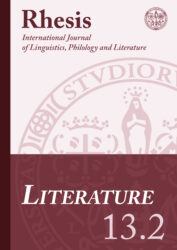 Literature
LiteratureVol. 6.2 - 2015
Download issue
Table of contents
| p. 5 | Territoire et littérature. Quelques excursions deçà et de-là de la mer MéditerranéeBertrand WestphalAbstract The perception that fictional representations transmit open a window on the complexity of the real world and on the multiplicity of shapes a territory may adopt. Faced to the variability that literature and other means of artistic expression promote, the absurdity of a one-way sighted territory becomes obvious. As Paul Ricoeur said, literature is a “laboratory of all possibilities”. It points out the options, but this doesn’t mean it has to give them a concrete reality, a material one. When it comes to the stakes of literature, one seems to be obvious: literature is bound to create new metaphors which may help people to read the world. Yet, if there are specifically literary metaphors, there are other ones which merge at the crossroad between different disciplines, and between various approaches to knowledge. Also in this case, literature performs a major part, given that it is able to handle all these metaphors and put them together. In this paper, some examples will be given about this issue, inside the Mediterranean area, especially through Paisajes transformados/Paisagtes transformats, where Quique Dacosta, one of the most prominent Spanish chefs and one of the most innovative ones, explains its view on a territory he particularly appreciates, the very area that surrounds Dénia, in the province of Alicante.
|
| p. 16 | Narration de l’amour et mémoire livresque: trois cas exemplairesPatrizio TucciAbstract This article considers the tendency of certain sentimental novels to construct or pad out their plot by appropriating and mirroring exteriors texts, thanks to a (sometimes) provocative process of decontextualization and recontextualization: as a consequence of these borrowings, literature holds the role of instrument of revelation, model or aliment in the construction of love affair. The corpus which is examined includes Daniele Cortis (1885) by Antonio Fogazzaro, Sixtine, roman de la vie cérébrale (1890) by Remy de Gourmont and Blanche ou l’oubli (1967) by Louis Aragon.
|
| p. 35 | Freeing Sardinia from Lawrence’s Narrative: Foxell’s Fascination with Linguistic TrapsMaria Grazia DonguAbstract Lawrence constructed his image of Sardinia to fit his own theories on European civilization in the aftermath of World War One. Foxell’s Sardinia Without Lawrence (2005) purposely deconstructs the unity of the celebrated Sea and Sardinia by exposing the aporias of Lawrentian discourse, fragments of a Victorian discourse on otherness, and by juxtaposing Lawrence’s quotations, his metatextual commentaries and a detailed description of the island. Foxell’s fascinating report is not only born out of another text, but by ‘translating’ and rewriting its hypotext frees Sardinia from ideological oriented past narratives.
|
| p. 50 | From Prospero to Peter Palmer: Appropriation of a Shakespearian Character in a Contemporary Short-Story Rewriting of The TempestIsabella MartiniAbstract As far as its afterlife during centuries is concerned, several transcodifications have been performed on The Tempest to make it go beyond the textual and stage limits prescribed by its hypotext, as if it had its own border to cross. This paper tries to focus on a peculiar transcodification, a contemporary short-story, “Rough Magic”, included in the volume Shakespeare Stories edited in 1982 by Giles Gordon (1940-2003), and written by the British journalist, literary critic and novelist David Hughes (1930-2005). Starting from a short overview both of the cultural reception of the play and of its adaptations, this paper aims at interpreting the story through a double perspective. First, by tracing the clues of a continuing fascination of imperialist will to power nowadays and its (metaphorical?) colonialist implications through a contrapuntal reading. Second, it attempts at exploring and decoding the complex multi-layered structure of dichotomies concerning the key-concept of borders which underlie the short-story narrative strategies, given the idea that the colonizing process performed by the protagonist can be seen as a multiple sequence of crossing borders.
|
| p. 60 | Éric Rohmer da Parigi a Clermont-Ferrand. Lettura di Rue Monge e Ma nuit chez Maud attraverso PascalAndrea CorsoAbstract Eric Rohmer’s short story Rue Monge, published in 2014 as a part of the collection Friponnes de porcelaine, gives the opportunity to know better the literary skill of the French director. The story features the basic plot of what will be Ma nuit chez Maud, which makes it possible to compare the two stories and to check what characteristics have changed and why. In the latter short story, Pascal’s strong influence and morality, as well as the setting in Clement Ferrand instead of Paris, are relevant instances of how the story itself can interfere with the protagonists’ fictional lives.
|
| p. 77 | Padre Luca Cubeddu: un poeta d’ArcadiaGianluca PisanuAbstract The poetry of Padre Luca Cubeddu, a Sardinian poet who lived between the 18th and the 19th century, has been associated by most of the historical and literary criticism of the 20th century to the Arcadian tradition. However, this association does not take into account the actual links that the author had with the Arcadian aesthetic, which spread on the island thanks to the Italianization policy made by the Piedmontese government. Textual analysis helps to attenuate the importance of this connection and distinguishes Padre Luca’s poetry from the typical themes and purposes of the “official” Arcadia. What emerges from this examination is an author who writes poetry for moral purposes. The analysis of the metric structures shows the poet’s distance from the forms used by Arcadia and his closeness to the metric and strophic heritage of the Hispanic-Sardinian tradition.
|
Tags: “sociological” Arcadia, Andrea Corso, Bertrand Westphal, city, comparative literature, food landscapes, geocriticism, Gianluca Pisanu, intertextual relationship, intertextuality, Isabella Martini, Maria Grazia Dongu, Mediterranean, metric structures, moral claims, morality, official Arcadia, Padre Luca Cubeddu, Paris, Pascal, Patrizio Tucci, postcolonial, rewriting, Sardinia Without Lawrence, Sea and Sardinia, Shakespeare, short-story, territory, The Tempest, theory of the novel, topology
 LiteratureVol. 6.2 - 2015
LiteratureVol. 6.2 - 2015
